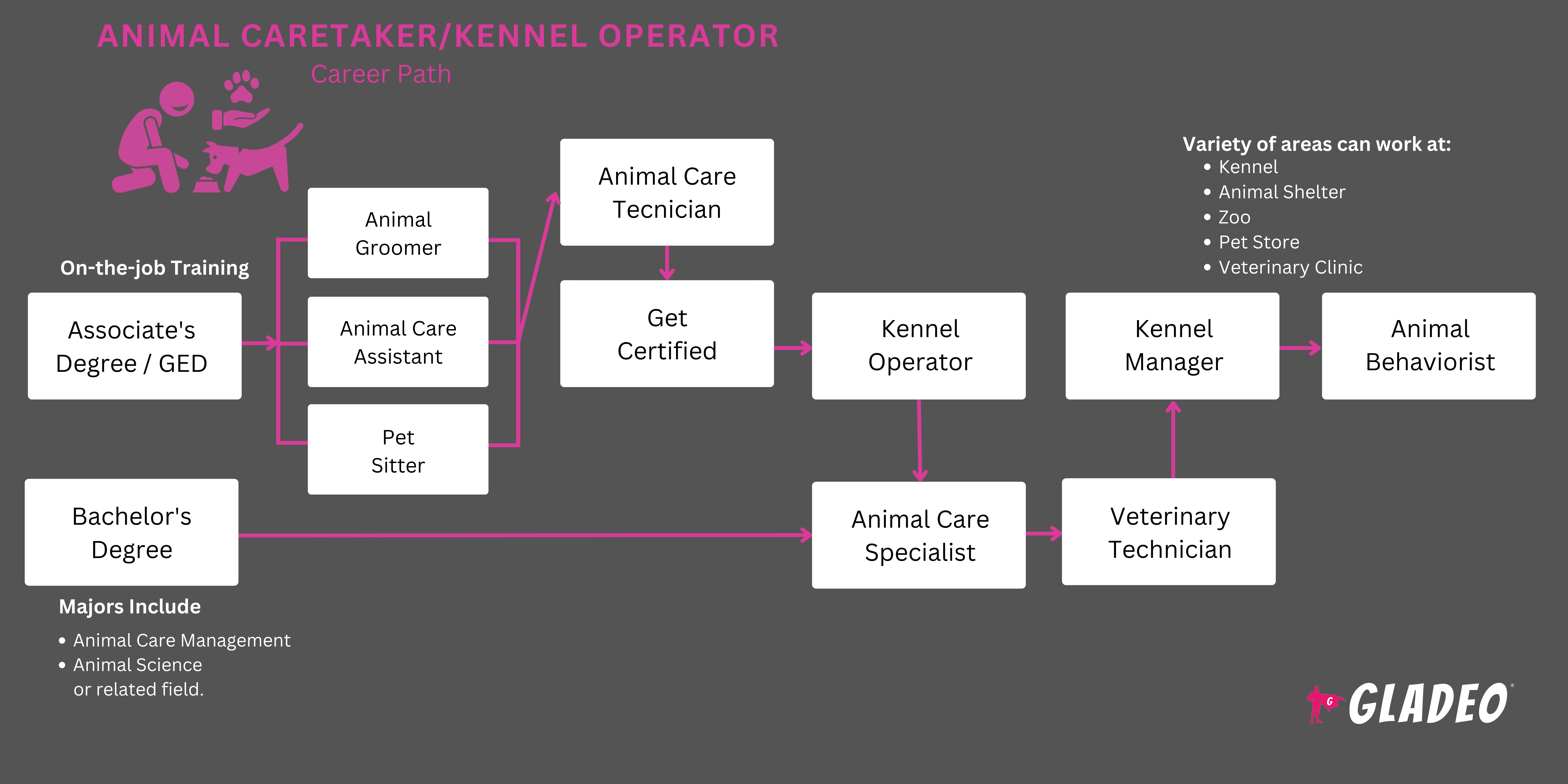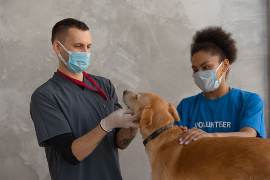스포트라이트
동물 관리사(ACG), 아쿠아리스트, 개 목욕, 개 미용사, 미용사, 개집 관리인, 개집 기술자(개집 기술), 애완동물 미용사, 애완동물 스타일리스트, 사육사
우리는 매일 지구를 함께 공유하는 동물들에 둘러싸여 있습니다... 눈에 보이거나 알아차리지 못하더라도 말이죠. 대부분의 동물은 야생에 살고 있지만, 수백만 마리가 반려동물, 가축 또는 다른 이유로 인간의 직접적인 보살핌을 받으며 살고 있습니다. 이러한 동물 중 일부는 사육장이나 보호소와 같은 임시 환경에 머무르며, 다른 동물들은 자연 서식지를 모방하여 설계된 동물원 우리에 갇혀 지냅니다.
동물 관리인과 사육장 운영자는 다양한 환경에서 동물을 돌봅니다. 이들은 자신이 돌보는 동물이 매일 잘 먹고, 충분한 관심과 운동을 받고, 안전할 때 목욕과 미용을 받을 수 있도록 합니다. 동물의 질병, 부상 또는 해충의 징후를 모니터링하고 필요한 경우 치료를 준비합니다. 또한 생활 공간을 깨끗하게 유지하고 잔해나 위험 요소가 없는지 확인합니다.
일부 보호자는 원치 않는 행동을 억제하기 위해 식단을 결정하거나 훈련 서비스를 제공하는 등 적극적인 역할을 수행합니다. 또한 입양 심사를 주선하고, 예방 접종을 돕고, 전화를 받고, 기록 관리와 같은 행정 업무를 관리하기도 합니다. 동물을 돌보는 일은 큰 책임감이 따르지만, 보람도 큰 직업입니다!
- 도움이 필요한 가축 또는 인간의 감독 하에 있는 야생 동물을 잘 돌보기
- 위험에 처한 동물들이 좋은 가정에 입양될 수 있도록 돕기
- 잠재적으로 위험한 동물로부터 지역사회를 안전하게 지키기
- 동물 매개 질병의 확산 완화
- 반려동물 주인이 일시적으로 반려동물과 떨어져 있을 때(예: 직장이나 여행 중) 반려동물과 함께 있을 수 있도록 지원
근무 일정
- 동물 관리사 및 사육장 운영자는 고용주의 필요에 따라 풀타임 또는 파트타임으로 일할 수 있습니다. 일부는 교대 근무에 배정되어 야간 또는 주말 근무를 해야 할 수도 있습니다.
일반적인 의무
- 새로운 동물의 입양을 조정합니다. 필요 사항과 문제를 평가합니다. 해당되는 경우 이전 보호자 또는 소유자와 요구 사항을 논의합니다.
- 적절한 조명, 온도 조절, 이동 공간을 갖춘 안전하고 위생적인 생활 공간 제공
- 해당되는 경우 수유, 물주기, 목욕, 몸단장, 운동 일정을 수립합니다.
- 동물이 목욕, 몸단장, 발톱 깎기 등에 대해 불안해할 때를 알아차리세요. 동물이 물거나 긁거나 도망가지 않도록 안심시킬 수 있는 조치를 취하세요. 필요에 따라 주의를 기울이고 보호 장비를 착용하세요.
- 음식 및 물 용기를 청소 및 소독하고, 정기적으로 생활 공간을 청소 및 소독하기 위해 동물을 일시적으로 이동시킵니다.
- 세탁물을 세탁하고, 동물과 접촉하는 장비나 용품(예: 말 안장)을 청소합니다.
- 직접 또는 비디오 모니터링을 통해 동물을 모니터링하세요. 질병, 부상 또는 비정상적인 행동의 징후를 관찰하세요.
- 식단, 건강, 체중, 치료 및 주목할 만한 문제를 기록하세요.
- 수의사 진료 및 검진 예약하기
- 지침에 따라 보충제 또는 처방약을 투여합니다.
- 규칙적인 운동과 장난감 놀이와 같은 스트레스 해소 활동을 준비합니다.
- 방문자 참여를 면밀히 모니터링하여 안전 보장
- 해당되는 경우 동물과 입양 가족을 연결해 드립니다.
추가 책임
- 간식 제공과 같은 강화 행동을 통해 동물 훈련하기
- 직접 또는 전화와 이메일을 통해 고객 서비스를 제공하고, 질문에 답하고, 팁을 제공하고, 추천을 제공하세요.
- 안전한 운송과 안전하고 견고한 전시 인클로저를 준비하세요.
- 물품 배송을 주문하고 수령합니다. 판매 전화 걸기와 같은 소매 운영 작업 수행
소프트 스킬
- 적응성
- 세부 사항에주의
- 헌신
- 동정
- 조정
- 고객 서비스
- 디테일 지향
- 독립의
- 무결성
- 모니터링
- 객관성
- 조직
- 끈기
- 체력
- 신뢰성
- 건전한 판단
- 체력
- 팀워크
- 신뢰성
기술 능력
- 동물 미용 및 관리
- 캘린더, 일정 관리 및 데이터베이스에 대한 기본 지식
- 응급 처치 및 개인 보호 장비
- 위생 및 소독 절차
- 동물 재활 센터, 보호소 및 병원
- 수족관
- 승마 센터 및 마구간
- 농장 및 목장
- 반려동물 기숙 시설/사육장/동물 탁아소
- 반려동물 매장 및 미용실
- 연구 센터 및 대학
- 자영업자
- 동물 병원
- 야생동물 보호구역
- 동물원
동물 관리인과 사육장 운영자는 자신이 돌보는 동물에 대해 많은 책임을 지고 있으며, 적시에 먹이를 주고 청소하는 일을 부지런히 해야 합니다. 또한 동정심이 필요하며 모든 동물의 건강과 웰빙을 돌봐야 합니다.
동물은 우리가 원하는 것과 달리 원하는 대로 행동하는 경향이 있기 때문에 때로는 지치거나 심지어 좌절감을 주는 일이 될 수도 있습니다! 동물이 다치거나 아프거나 긴장하면 행동이 급변하여 돌보기가 더 어려워질 수 있습니다. 실제로 동물을 돌보는 일은 때때로 위험한 일이 될 수 있으므로 물거나 긁히지 않도록 조심해야 합니다.
특히 동물의 건강 상태가 좋지 않아 보호자가 수의사의 안락사 절차를 도와야 하는 경우에는 감정적으로 힘든 일이 될 수 있습니다.
전체론적이고 자연스러운 동물 돌봄 방법에 대한 관심이 높아지고 있습니다. 예를 들어, 많은 반려동물 보호자들은 반려동물에게 천연/유기농 식품만 먹이거나 허브 보충제를 먹이기를 원합니다. 반려동물을 위한 아로마 테라피나 기타 요법을 원할 수도 있습니다.
환경을 생각하는 반려동물 보호자는 재생 가능한 재료로 만든 장난감과 같은 친환경 제품을 원할 수도 있습니다. 반려동물 소유주는 까다로울 수 있으므로 동물 보호자와 사육장 운영자는 동물을 돌보는 데 동의하기 전에 잠재 고객의 모든 요구 사항을 이해해야 합니다.
한편, 목걸이와 기타 웨어러블 기기의 스마트 기술이 급성장하고 있습니다. 이를 통해 보호자는 반려동물의 건강과 활동을 모니터링하고 자동 수유 시스템이나 원격 카메라를 설정하여 직장이나 여행 중에도 반려동물에게 먹이를 주고 지켜볼 수 있습니다. 동물 보호자들도 이러한 기술을 활용할 수 있습니다.
동물 관리사와 사육장 운영자는 동물과 함께 자란 경우가 많습니다. 동물이 많은 농장이나 시골에서 살았을 수도 있고, 어렸을 때 단순히 많은 반려동물을 키웠을 수도 있습니다! 학창 시절에는 4-H, 미국 미래 농업인 협회, 전국 고등학교 로데오 협회 또는 기타 동물 관련 활동에 참여했을 수도 있습니다.
어떻게 동물과 인연을 맺게 되었는지는 몰라도, 이들은 동물과 정기적으로 함께 일하는 직업을 구할 정도로 그 경험을 즐겼습니다. 대부분은 동물을 돌보는 일에 매우 열정적이며 공감과 연민을 많이 가지고 있습니다. 이들은 실용적이고 열심히 일하며 모든 종류의 동물을 편안하게 대하기 때문에 동물들도 편안하고 안락한 느낌을 받을 수 있습니다!
- 동물 보호사/사육장 운영자는 일반적으로 고등학교 졸업장 또는 이와 동등한 학력이 있으면 일을 시작할 수 있습니다.
- 일부 고용주는 관련 대학 과정을 이수한 지원자를 선호할 수 있지만, 경력이 주요 자격 요건인 경우가 많습니다.
- 더 큰 직장에 지원하기 전에 자원 봉사, 인턴십 또는 소규모 현장에서 아르바이트를 통해 경험과 기술을 쌓을 수 있습니다.
- 고용주는 일반적으로 실무 교육도 제공합니다.
- 미용 또는 교육 서비스를 수행하려는 사람은 커뮤니티 칼리지 수업을 듣거나 필요한 기술을 배우기 위해 특정 교육 프로그램을 이수해야 할 수 있습니다.
- 아래 기관에서 제공하는 선택적 인증도 자격 증명을 강화할 수 있습니다:
- 전문 반려견 훈련사 인증 위원회
- 개 훈련사 자격증
- 행동 컨설턴트 자격증
- 공인 승마 협회 - 말 시설 관리자
- 국립 동물 관리 및 통제 협회 - NACA ACO I
- 전국 전문 펫시터 협회 - 반려동물 관리 자격증 과정
- 미국 애견 미용사 협회 - 국가 공인 마스터 미용사
- 펫시터 인터내셔널 - 인증된 전문 펫시터
- 의학 및 연구 분야의 공적 책임 - 인증된 전문 IACUC 관리자
- 사업을 시작하는 자영업자는 주에서 발급하는 면허가 필요할 수 있습니다.
- 동물 관리사 및 사육장 운영자는 대학 학위가 필요하지 않습니다. 하지만 미용, 훈련 또는 기타 전문 업무를 하는 사람은 수업을 듣거나 교육 프로그램을 이수해야 할 수 있습니다.
- 커뮤니티 칼리지 또는 직업 훈련 프로그램 찾기
- 실무 경험을 쌓을 수 있는 인턴십 기회 찾기
- 수업료 및 수수료 비용을 비교하여 주 내 비용과 타주 비용에 주목하세요.
- 장학금 및 재정 지원 옵션 검토
- 졸업생 졸업 및 취업 통계 확인하기
- 고등학교에서는 영어, 수학, 생물학, 비즈니스뿐만 아니라 동물 관련 주제를 공부하세요.
- 4-H와 같은 농업 관련 학교 프로그램이나 활동에 등록하기
- 감독 농업 체험 및 전국 FFA 조직과 같은 농업 관련 클럽 및 활동에 참여하세요.
- 말과 함께 일할 계획이라면 전국 고등학교 로데오 협회의 일원이 되는 것을 고려하세요.
- 동물과 직접 일하며 실제 경험을 쌓을 수 있는 아르바이트에 지원하세요. 구인 사이트 옵션에는 다음이 포함됩니다:
- 동물 재활 센터, 보호소 및 병원
- 수족관
- 승마 센터 및 마구간
- 농장 및 목장
- 반려동물 기숙 시설/사육장/동물 탁아소
- 반려동물 매장 및 미용실
- 연구 센터 및 대학
- 자영업
- 동물 병원
- 야생동물 보호구역
- 동물원
- 집에 동물이 있다면, 동물과 함께 좋은 관리 기술을 연습하세요.
- 현직 동물 보호사나 사육장 운영자에게 연락하여 정보 제공 인터뷰를 요청하세요. 하루 동안 일터에서 섀도잉을 할 수 있는지 알아보세요!
- 특정 동물 유형, 미용, 훈련 등 어떤 분야를 전문적으로 다루고 싶은지 정확히 결정하세요.
- 필요한 경우, 입사 지원 전에 자격증 또는 준학사 학위를 취득하세요(예: 전문 반려견 훈련사 협회의 반려견 훈련사 자격증 또는 펫시터 인터내셔널의 공인 전문 반려동물 시터 자격증).
- 원하는 특정 직종과 관련된 기사를 읽고 방법 동영상을 시청하세요.
- 온라인 포럼을 검토하고 노련한 전문가에게 질문하기

미국 노동통계국에 따르면 "동물 돌봄 및 서비스 종사자의 전체 고용은 2021년부터 2031년까지 29% 증가할 것으로 예상됩니다." 이는 전체 직종 평균보다 24% 더 높은 수치입니다. 즉, 이 직업 분야는 새로운 일자리로 폭발적으로 성장할 준비가 되어 있는 것으로 보입니다!
하지만 동물 관리사와 사육장 운영자는 다양한 분야에서 일할 수 있습니다. 개나 고양이만 다루고 싶으신가요? 말이 전문 분야인가요? 동물원처럼 다양한 동물을 돌보고 싶으신가요? 일자리에 지원하기 전에 구체적으로 어떤 일을 하고 싶은지 생각해보고 장기적인 경력 목표에 맞게 경험을 조정하세요!
- 인디드닷컴, 글래스도어, 집리크루터, 크레이그리스트와 같은 채용 포털을 검색하세요.
- 채용 공고를 검토하여 키워드와 문구를 찾아 지원 자료에 반영하세요(해당되는 경우).
- 구직 중이라는 사실을 인맥에 알리세요. 동물 돌봄 관련 일자리는 대부분 개인적인 인맥을 통해 구할 수 있습니다.
- 이미 많은 경험이 있다면 다른 회사에 지원하는 대신 자신의 사업을 시작하는 경우도 드물지 않습니다. 개 산책 서비스나 애완동물 돌보미 사업처럼 기본적인 사업일 수도 있습니다.
- 전 직장 동료, 상사, 교사 또는 고객에게 연락하세요. 이들에게 개인적인 추천인 역할을 해줄 수 있는지 물어보세요. 허락 없이 연락처 정보를 제공하지 마세요.
- 동물 관리사 및 사육장 운영자 이력서 샘플 검토하기
- 고용주나 잠재 고객이 질문할 수 있는 면접 질문을 조사해 보세요. 질문은 찾고 있는 직종에 따라 달라질 수 있다는 점을 명심하세요.
- 해당 분야의 어휘에 익숙해지세요. 예를 들어 "개 단어" 또는 "개 미용" 용어집을 확인해 보세요!
- 맡겨진 모든 동물을 훌륭하게 관리하여 확고한 평판을 쌓으세요.
- 동물의 모든 필요를 충족시키기 위해 매일 그 이상의 노력을 기울이세요.
- 체계적으로 일정을 관리하세요. 일일 작업을 완료하고 필요에 따라 다른 작업자를 도와주세요.
- 신입 직원이나 자원봉사자 교육과 같은 추가 책임을 요청하세요.
- 고용주 정책과 주 또는 연방 규정을 준수하면서 효율성과 생산성을 향상시킬 수 있는 방법을 찾아보세요.
- 지속적인 교육과 훈련에 매진하세요. 채우기 어려운 틈새 분야를 전문화하는 것을 고려하세요.
- 동료, 관리자, 고객, 현지 에이전시 또는 기타 서비스 제공업체와 강력한 업무 관계를 구축하세요.
- 전문 단체에 참여하여 배우고, 친구를 사귀고, 기회를 발견하세요(추천 리소스 목록 참조).
- 현재 고용주에게 승진 기회가 없다면 더 큰 조직에 지원하거나 자신의 사업을 시작하는 것도 고려해 보세요!
웹사이트
- 골목 고양이 동맹
- 미국 동물원 사육사 협회
- 미국 고양이 애호가 협회
- 미국 수산 학회
- 미국 인도주의 협회
- 아메리칸 켄넬 클럽
- 미국 페인트 말 협회
- 미국 동물 학대 방지 협회
- 미국 동물 과학 협회
- 미국 동물 행동 학회
- Assistance Dogs International, Inc.
- 전문 개 훈련사 협회
- 동물원 및 수족관 협회
- 질병 통제 센터
- 전문 반려견 훈련사 인증 위원회
- 공인 응용 동물 행동 전문가
- dogbiz
- 반려견을 위한 온라인 교육
- 농장 서비스 대행사
- 그리샤 스튜어트의 동물 빌딩 블록 아카데미
- 국제 기승술 협회
- 국제 해양 동물 조련사 협회
- 전국 개 복종 지도자 협회
- 전국 전문 펫시터 협회
- 미국 애견미용사 협회
- 동물의 윤리적 대우를 위한 사람들
- 반려동물 파트너
- 펫시터 인터내셔널
- 반려견 키우기
- 전문 개 훈련사 협회
- 야생 동물 협회
- 미국 환경 보호국
- 미국 어류 및 야생동물 관리국
- 미국 동물학 협회
책
- 자신감 있는 동물 의사소통자: 반려동물, 구조 동물, 야생동물을 돕는 직관적인 동물 의사소통을 배우기 위한 최고의 가이드카라 구빈스, 로렌 캐시디 저자
- 개와 고양이를 위한 응급처치 동반자(예방 반려동물)작성자: 에이미 쇼자이
- 최고의 반려동물 건강 가이드: 개와 고양이를 위한 획기적인 영양과 통합 케어작성자: 게리 리히터 MS DVM
- 동물 주인을 위한 수의학 가이드: 고양이, 개, 닭, 양, 소, 토끼 등 돌보기, C. E. 스폴딩, 재키 클레이 저
동물 관리사와 사육장 운영자는 다양한 환경에서 다양한 종류의 동물을 보호하는 데 중요한 역할을 담당합니다. 이 직업은 매우 실무적인 직업이며 보람도 있지만, 몇 가지 좌절과 위험이 따르기도 합니다. 동물과 함께 일하는 데 관심이 있지만 다른 직종에 종사하고 있다면 아래 제안을 확인해 보세요!
- 동물 행동학자
- 동물 사육사
- 동물 관리 작업자
- 동물 영양사
- 동물 사진작가
- 동물 조련사
- 말 조련사
- 해양 생물학자
- 수의사
- 수의사 보조
- 동물학자 및 야생동물 생물학자
뉴스 피드

주요 채용 정보

온라인 과정 및 도구

연봉 기대치
신입 직원의 초봉은 약 3만 6천 달러입니다. 중간 급여는 연간 3만 7천 달러입니다. 고도로 숙련된 근로자는 약 3만 9천 달러를 받을 수 있습니다.





